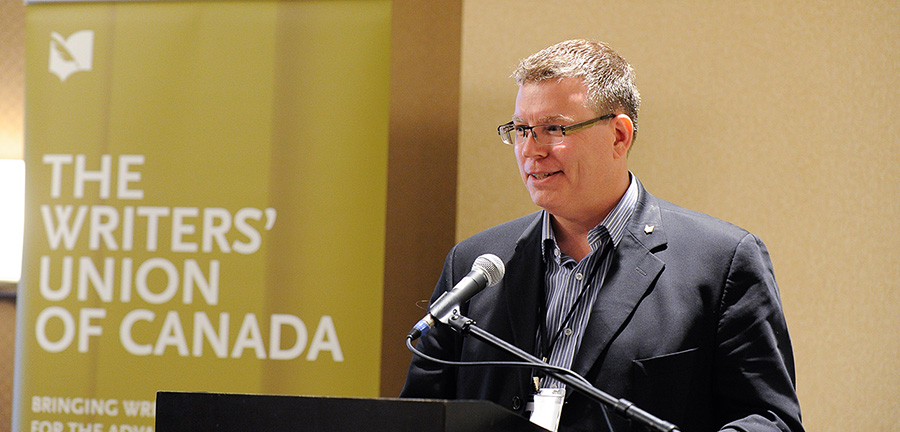Oh Canada! How Not to Reform Copyright

Educational exceptions to copyright introduced in Canada four years ago have had a devastating effect on writers' incomes, with similar consequences reported in Ireland and Australia. Writers in the UK must remain on high alert to this threat, argues John Degen.
As both the European Commission and the World Intellectual Property Organization continue to consider new proposed exceptions to copyright under the deceptively friendly catch-all term “modernisation”, Canadian writers look across the ocean in a state of uncomfortable déjà vu. We’ve been through this modernisation exercise ourselves and, frankly, it did not work out well for Canadian culture or for the workers who create it.
In 2012, against the objections of Canada’s writers and publishers, poorly planned amendments were introduced to our Copyright Act. Specifically, the word “education” was added to the Act as a separate category of fair dealing, with no attendant definition, regulation or limits imposed. Immediately following passage of what was officially called the Copyright Modernization Act, writers and publishers in this country saw an established and necessary secondary market for educational copying all but disappear. Millions of books’ worth of copying, which was once licensed under a very efficient collective mechanism, are now claimed for free and without permission by Canada’s educational sector. The resulting loss of income stands at approximately C$30 million per year, which for Canada’s relatively small domestic market is extremely damaging. In time, it may prove a killing blow.
Canada is now in the humiliating position of being the world’s best example of how not to reform copyright. Having experienced the relentless pressure for new exceptions and exemptions, and the frustration of seeing government consider proposed exceptions as though they are somehow progressive and reforming, I want to encourage my overseas colleagues to stand strong for your creators’ rights. There is, in my opinion, nothing progressive about broad exceptions to copyright, even those proposed for motherhood concerns like education and library collection. Instead, they represent a regressive deregulation designed to do little more than transform earned income for writers into cost-savings for financial administrators and extra profit for free-culture digital businesses.
And, as Canada has also shown, broad exceptions do not actually deliver on promised increased access or cost-savings for frontline teachers and their students. Since 2012, student costs for accessing educational materials have actually risen in Canada, despite all the uncompensated copying schools now do. As well, liability for copyright clearance has been off-loaded to instructors, who report widespread confusion about what they can and cannot use, and fear that they are crossing legal lines. A growing and expensive middle-management layer of copyright officers on campuses across Canada is certainly not delivering promised efficiencies in that regard.
Here’s some advice to those engaged in this fight outside Canada:
1. Don’t let the terms be defined for you.
Those calling for “reform” and “modernisation” of copyright must be challenged to detail exactly what they’re looking for. In my experience, the term “copyright reform” almost always means a substantial weakening of creator rights. Calls to modernize the law to account for new digital uses never seem to include workable safeguards for author rights. Those leading the tech revolution have been able to map our entire world and put a global library of information onto our phones, yet such things as permissions and payment remain beyond the reach of their genius. Don’t buy it, and don’t let your legislators buy it either. For every so-called “reform” proposal, we must demand to see exactly how author rights and livelihoods will be protected. Get it in writing.
2. Refuse to be positioned as the enemy of access.
The global copyfight has generated a number of howling logical inconsistencies, but none so ridiculous as the notion that those calling for strong copyright laws, or resisting overly broad exceptions, are anti-access. Copyright defenders are regularly accused of wanting to lock down culture[i] and deny access to information. I can’t count how many times I’ve had such accusations flung my way on social media. I am a novelist and a poet. My entire raison d’etre is to reach readers and encourage them to read my works. I welcome any system that encourages universal access to my work. I simply don’t see why that access has to come with an attendant loss of control or compensation.
3. Most importantly: Stress your traditional partnership with educators and students.
Writers create the works being assigned by teachers and studied by students. In Canada, not-for-profit organisations like The Writers’ Union of Canada administer programmes that pay authors to visit classrooms across the country and present their work to students. We encourage and safeguard the crucial cultural relationship between Canada’s young readers and our authors. And yet, during Canada’s copyright debate, writers were portrayed as standing in the way of education. Expecting to be paid does not make one anti-education. Ask a teacher.
John Degen is a novelist and poet. He is Executive Director of The Writers’ Union of Canada, an organization representing more than 2,000 professional authors. He is also Chair of the International Authors Forum, which represents over 600,000 professional authors worldwide.
[i] See for instance the free culture movement’s seminal text, Free Culture: How Big Media Uses Technology and the Law to Lock Down Culture and Control Creativity, by Lawrence Lessig.
